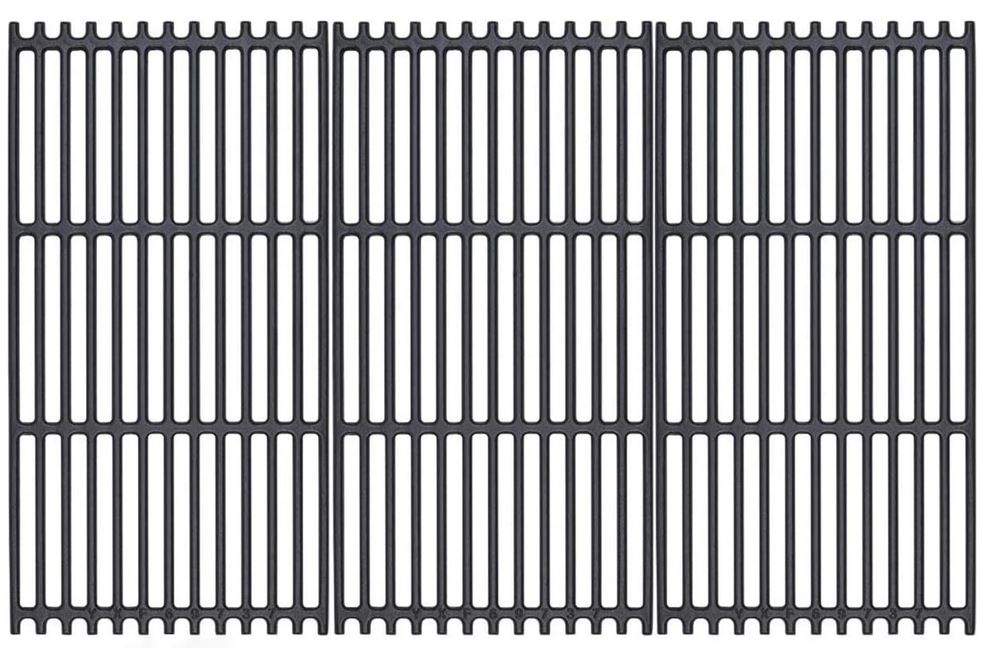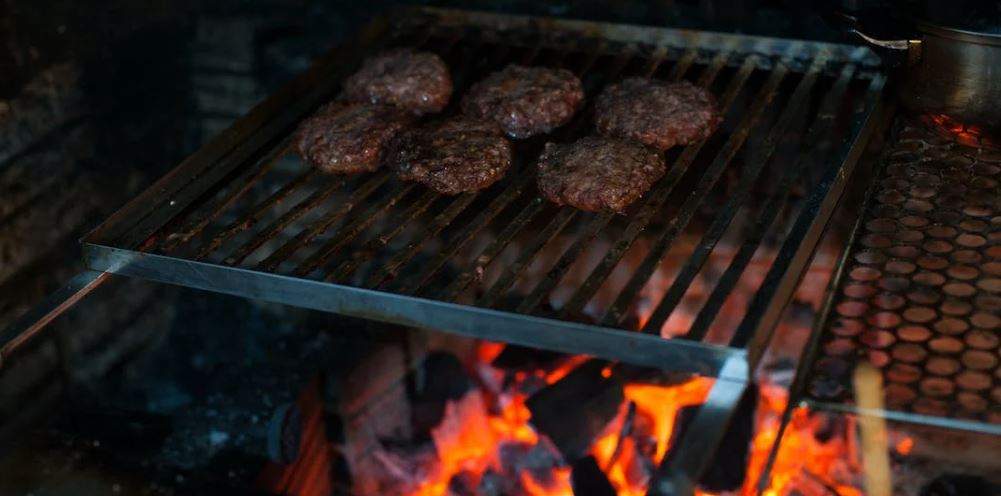There’s nothing quite like the sizzle of meat hitting a hot grill grate on a sunny day. Cast iron grill grates are prized by many for their excellent heat retention and even cooking abilities. However, like all things, they require proper care to maintain their performance. One common issue that grill enthusiasts often encounter is flaking on cast iron grill grates. In this blog, we’ll delve into the causes behind this phenomenon and provide you with valuable tips on how to prevent and manage flaking to ensure your grill grates last for years to come.
Cast Iron Grill Grates Flaking Causes
Flaking on cast iron grill grates, also known as rust or seasoning loss, occurs when the layer of polymerized oil that provides the non-stick surface deteriorates. This can lead to small flakes or patches of the seasoning coming off. Several factors contribute to this issue:
- Moisture Exposure: One of the primary culprits behind flaking is moisture. If the grill grates are exposed to rain, high humidity, or are not dried properly after cleaning, water can penetrate the pores of the cast iron, leading to rust and flaking.
- High Heat Fluctuations: Rapid changes in temperature can cause the metal to expand and contract, potentially weakening the seasoning layer and leading to flaking. Preheating your grill gradually can help mitigate this issue.
- Abrasive Cleaning Techniques: Aggressive cleaning methods such as using wire brushes, harsh chemicals, or abrasive scrubbing pads can remove the seasoning layer and damage the surface of the grill grates, making them more prone to flaking.
- Inadequate Seasoning Maintenance: Cast iron grill grates require regular seasoning to maintain their non-stick properties and prevent rust. Failure to re-season your grates after cooking can result in seasoning loss and flaking.
Also read: The Best Type of Grill Grate for Your Grill: [All You Need to Know]
Cast Iron Grill Grates Flaking Prevention Tips
- Regular Cleaning: Clean your grill grates after each use. Use a grill brush with soft bristles to remove food residue. Avoid wire brushes that can scratch the surface.
- Proper Drying: After cleaning, make sure to dry your grill grates thoroughly to prevent moisture from causing rust. Towel-drying followed by air-drying is recommended.
- Seasoning Maintenance: Re-season your grill grates periodically, especially after cooking acidic foods. Apply a thin layer of high-smoke-point oil (such as vegetable oil) and heat the grates to polymerize the oil and create a protective coating.
- Avoid Harsh Cleaners: Use mild, non-abrasive cleaners and avoid harsh chemicals that can strip away the seasoning layer.
- Gradual Preheating: Preheat your grill gradually to reduce the stress on the metal caused by rapid temperature changes.
Managing Flaking and Rust
If you notice flaking or rust on your cast iron grill grates, don’t panic. Here’s what you can do:
- Scrub Gently: Use a nylon brush or non-abrasive scrubbing pad to remove rust and loose flakes. Be gentle to avoid damaging the surface further.
- Re-Seasoning: After cleaning, apply a thin layer of oil and re-season the grill grates by heating them for an extended period. This will help rebuild the protective seasoning layer.
- Prevent Future Flaking: Focus on better maintenance practices to prevent the issue from recurring.
Is it OK to cook on rusty grill grates?
Cooking on rusty grill grates is not recommended. Rust can transfer onto your food, affecting both its taste and safety. Moreover, rust compromises the structural integrity of the grates, making them more prone to further deterioration and flaking.
To ensure a safe and enjoyable grilling experience, it’s best to address rust issues promptly by cleaning, scrubbing, and re-seasoning the grates before cooking.
When should you throw away grill grates?
Grill grates should be considered for replacement when they exhibit severe rust, extensive flaking, or structural damage that can’t be remedied through cleaning or re-seasoning. If rust or flaking is widespread, it can impact food safety and taste.
Additionally, if the grates are warped, cracked, or significantly corroded, they may not provide even heat distribution and could pose safety risks. Regular inspection and maintenance can extend the life of grill grates, but when they become unsafe to use or hinder cooking performance, it’s time to invest in new grates to ensure a satisfying and safe grilling experience.
Porcelain-enameled cast iron grill grate (Our recommendation)

Porcelain-enameled cast iron grill grates combine the exceptional heat retention and distribution properties of cast iron with the added benefits of a smooth and durable porcelain coating. These features make them a popular choice for many grill enthusiasts.
Here are some key features and advantages of porcelain-enameled cast iron grill grates:
- Non-Stick Surface: The porcelain coating creates a smooth and non-stick surface that makes cooking and cleaning easier. This is especially useful for delicate foods like fish and vegetables that might otherwise stick to traditional cast iron grates.
- Heat Retention and Distribution: Just like plain cast iron, porcelain-enameled cast iron retains heat effectively and distributes it evenly across the cooking surface. This results in consistent cooking and searing, giving your food those coveted grill marks.
- Durability: The porcelain enamel adds a layer of protection to the cast iron, making the grates more resistant to rust and corrosion. This can extend the lifespan of the grates and reduce the need for frequent re-seasoning.
- Easy to Clean: The non-stick surface and the enamel coating make cleaning these grates simpler compared to raw cast iron. Food particles are less likely to adhere, and the smooth surface can often be wiped clean with a damp cloth or grill brush.
- Less Seasoning Required: While some maintenance is still recommended, porcelain-enameled cast iron grates generally require less frequent seasoning compared to uncoated cast iron grates.
- Aesthetic Appeal: Porcelain-enameled grates are available in various colors, allowing you to customize the look of your grill. This can be a great way to match your grill’s appearance with your outdoor space or personal style.
- Reduced Flare-Ups: The porcelain coating can help reduce flare-ups by preventing drippings from coming into direct contact with the flames, thus minimizing the risk of sudden bursts of flames.
- Ideal for Low-Fat Cooking: The non-stick surface enables you to cook with less oil, making it a healthier option for those watching their fat intake.
How long do cast iron grates last?
The lifespan of cast iron grill grates can vary depending on usage, care, and environmental conditions. With proper maintenance, including regular seasoning, gentle cleaning, and protection from moisture, cast iron grates can last for many years.
Generally, well-maintained grates can be expected to last anywhere from 5 to 15 years or even longer. Regular inspection for signs of rust, flaking, and structural integrity is essential to determine when replacement is necessary.
Ultimately, the longevity of cast iron grill grates is a result of the diligence you put into their care and maintenance.
Also read>> Weber Grill Frame Rusted – Here is what to do
Conclusion
Cast iron grill grates are fantastic cooking tools that can elevate your outdoor culinary experience. By understanding the causes of flaking and taking preventive measures, you can ensure that your grill grates remain in top condition, providing you with deliciously cooked meals for years. Regular cleaning, proper seasoning, and careful usage will go a long way in preserving the integrity of your cast iron grill grates.
Courtney is a professional grilling enthusiast who has spent a good portion of his life grilling and exploring different methods and techniques for preparing delicious meals. As he always says, creativity is key to preparing sumptuous meals.
